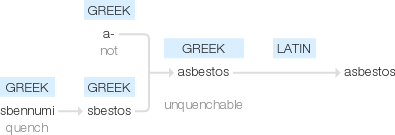Asbestos
early 17th century, via Latin from Greek asbestos ‘unquenchable’ (applied by Dioscurides to quicklime), from a- ‘not’ + sbestos (from sbennumi ‘quench’).
wiktionary
From Old French abestos, from Latin asbestos, itself from Ancient Greek ἄσβεστος(ásbestos, “unquenchable, inextinguishable”), from ᾰ̓-(a-, “not”) + σβέννῡμῐ(sbénnūmi, “I quench, quell”).
etymonline
asbestos (n.)
1650s, earlier albeston, abestus (c. 1100), name of a fabulous stone, which, set afire, could not be extinguished; from Old French abeste, abestos (Modern French asbeste), from Latin asbestos "quicklime" (which "burns" when cold water is poured on it), from Greek asbestos, literally "inextinguishable," from a- "not" (see a- (3)) + sbestos, verbal adjective from sbennynai "to quench," from PIE root *(s)gwes- "to quench, extinguish" (source also of Lithuanian gesti "to go out," Old Church Slavonic gaso, Hittite kishtari "is being put out").
The Greek word was used by Dioscorides as a noun meaning "quicklime." "Erroneously applied by Pliny to an incombustible fibre, which he believed to be vegetable, but which was really the amiantos of the Greeks" [OED]. Asbestos in this "fibrous mineral capable of being woven into incombustible fabric" sense is in English from c. 1600; earlier this had been called amiant (early 15c.), from the Greek word mentioned above, which means "undefiled" (because it showed no mark or stain when thrown into fire). Supposed in the Middle Ages to be salamanders' wool; another old name for it in English was fossil linen (18c.). Prester John, the Emperor of India, and Pope Alexander III were said to have had robes or tunics made of it.
